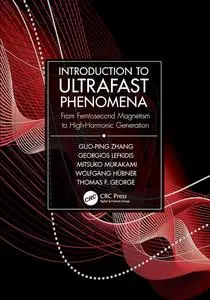
Free Download Introduction to Ultrafast Phenomena: From Femtosecond Magnetism to High-Harmonic Generation by Guo-ping Zhang, Georgios Lefkidis, Mitsuko Murakami
English | December 9, 2020 | ISBN: 1498764282 | 300 pages | MOBI | 24 Mb
This book, the first of this kind, provides a comprehensive introduction to ultrafast phenomena, covering the fundamentals of ultrafast spin and charge dynamics, femtosecond magnetism, all-optical spin switching, and high-harmonic generation. It covers the experimental tools, including ultrafast pump-probe experiments, and theoretical methods including quantum chemistry and density functional theory, both time-independent and time-dependent. The authors explain in clear language how an ultrafast laser pulse is generated experimentally, how it can induce rapid responses in electrons and spins in molecules, nanostructures and solids (magnetic materials and superconductors), and how it can create high-harmonic generation from atoms and solids on the attosecond timescale. They also show how this field is driving the next generation of magnetic storage devices through femtomagnetism, all-optical spin switching in ferrimagnets and beyond, magnetic logic in magnetic molecules, and ultrafast intense light sources, incorporating numerous computer programs, examples, and problems throughout, to show how the beautiful research can be done behind the scene.
Key features:
· Provides a clear introduction to modern ultrafast phenomena and their applications in physics, chemistry, materials sciences, and engineering.
· Presents in detail how high-harmonic generation occurs in atoms and solids.
· Explains ultrafast demagnetization and spin switching, a new frontier for development of faster magnetic storage devices.
· Includes numerous worked-out examples and problems in each chapter, with real research codes in density functional theory and quantum chemical calculations provided in the chapters and in the Appendices.
This book is intended for undergraduate and graduate students, researchers in physics, chemistry, biology, materials sciences, and engineering.
